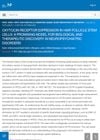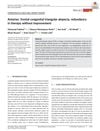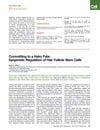 January 2025 in “Lasers in Medical Science”
January 2025 in “Lasers in Medical Science” Combining fractional CO2 laser with topical dutasteride is more effective for treating male hair loss than using the laser alone.
 8 citations,
February 2022 in “Journal of Clinical Medicine”
8 citations,
February 2022 in “Journal of Clinical Medicine” Many COVID-19 patients experience temporary hair loss after infection, not linked to infection severity or treatment.
 October 2023 in “IBRO neuroscience reports”
October 2023 in “IBRO neuroscience reports” Rat hair follicle stem cells have functional oxytocin receptors, useful for studying neuropsychiatric disorders.
 5 citations,
October 2018 in “Dermatologic therapy”
5 citations,
October 2018 in “Dermatologic therapy” Recognizing congenital triangular alopecia is crucial to avoid unnecessary treatments.
 4 citations,
October 2022 in “Microbial Cell Factories”
4 citations,
October 2022 in “Microbial Cell Factories” Certain bacteria from the Citrullus colocynthis plant may be a new source of antibiotics to fight drug-resistant diseases.
 3 citations,
July 2021 in “Life science alliance”
3 citations,
July 2021 in “Life science alliance” PNKP is essential for keeping adult mouse progenitor cells healthy and growing normally.
May 2016 in “Hair transplant forum international”  1 citations,
January 2013 in “MedChemComm”
1 citations,
January 2013 in “MedChemComm” PF-05314882 selectively activates androgen receptors without much effect on prostate and may help in prostate cancer treatment and hair loss prevention.
 July 2023 in “Dermatology practical & conceptual”
July 2023 in “Dermatology practical & conceptual” Women with Female Pattern Hair Loss may experience more stress, anxiety, and depression, and have lower levels of BDNF, which could predict the psychological impact.
 5 citations,
September 2011 in “Cell stem cell”
5 citations,
September 2011 in “Cell stem cell” Epigenetic changes are crucial for hair follicle stem cells to function properly.
 4 citations,
September 2018 in “International journal of research - granthaalayah”
4 citations,
September 2018 in “International journal of research - granthaalayah” Most female students at Qassim University know about PCOS, but there are still misunderstandings about it.
 May 2023 in “JAAD international”
May 2023 in “JAAD international” Minoxidil-dutasteride tattooing can potentially help regrow hair, especially in men who already have some thin hair.
April 2016 in “Dermatology Times” Ginseng might help with energy, memory, aging, cancer, skin issues, and hair loss.
 27 citations,
May 2015 in “Neuropharmacology”
27 citations,
May 2015 in “Neuropharmacology” Dutasteride protects dopamine neurons in Parkinson's mice, but Finasteride doesn't.
 2 citations,
November 2019 in “Cancer reports”
2 citations,
November 2019 in “Cancer reports” The Wnt signaling pathway is not a major factor in the development of keratoacanthoma, a type of skin tumor.
 29 citations,
July 2012 in “Fertility and Sterility”
29 citations,
July 2012 in “Fertility and Sterility” Low and ultralow doses of flutamide can cause liver damage in young women with high androgen levels, regardless of dose or birth control use, with higher risk for those with higher BMI and liver enzyme levels before treatment.
 47 citations,
June 2011 in “Movement Disorders”
47 citations,
June 2011 in “Movement Disorders” The LRRK2-G2019S mutation in Parkinson's disease has a lifetime penetrance of 25-35%, and finasteride may help reduce symptoms in adult male Tourette syndrome patients.
 1 citations,
September 2020 in “Journal of the Endocrine Society”
1 citations,
September 2020 in “Journal of the Endocrine Society” Men have worse COVID-19 outcomes than women due to genetic and hormonal differences.
 42 citations,
April 2021 in “Journal of clinical pharmacology”
42 citations,
April 2021 in “Journal of clinical pharmacology” Baricitinib helps treat several diseases, including COVID-19, but has side effects and needs careful monitoring.
 16 citations,
March 2008 in “Dermatologic Surgery”
16 citations,
March 2008 in “Dermatologic Surgery” Hydrogen peroxide's effects on wound healing in hair transplants are unclear, and it may slow healing and increase scarring.
5 citations,
July 2018 in “Skin appendage disorders” Sunscreen spray on the scalp may be linked to a type of scarring hair loss.
 30 citations,
December 1999 in “International Journal of Dermatology”
30 citations,
December 1999 in “International Journal of Dermatology” Finasteride increases hair count in middle-aged and elderly men without causing sexual dysfunction.
 7 citations,
February 2022 in “JAAD International”
7 citations,
February 2022 in “JAAD International” COVID-19 may be linked to hair loss or worsening of hair loss in some people.
 4 citations,
January 2022 in “Dermatologic Therapy”
4 citations,
January 2022 in “Dermatologic Therapy” Tofacitinib was found to be a safe and effective treatment for hair regrowth in patients with alopecia areata.
June 2023 in “Journal of dermatology for physician assistants” Lichen planopilaris should be considered when diagnosing hair loss in people with darker skin as it may be often missed.
February 2024 in “Deleted Journal” The dog recovered well from skin cancer and intestinal blockage after treatment.
 1 citations,
January 2023 in “Journal of Clinical Medicine”
1 citations,
January 2023 in “Journal of Clinical Medicine” A new hair restoration technology was found to effectively increase hair thickness, density, and growth, while reducing hair loss and improving scalp health, with no side effects.
 May 2023 in “Elsevier eBooks”
May 2023 in “Elsevier eBooks” Systemic immunotherapies are used for immune-related hair loss but not usually for genetic hair loss, unless the patient has both conditions.
18 citations,
June 2020 in “Dermatologic Therapy” FCO2 laser is a better treatment for alopecia areata than intralesional steroids.
 January 2022 in “Tissue & Cell”
January 2022 in “Tissue & Cell” Using both platelet-rich plasma and minoxidil together gives the best results for hair growth in male rats with hair loss.























